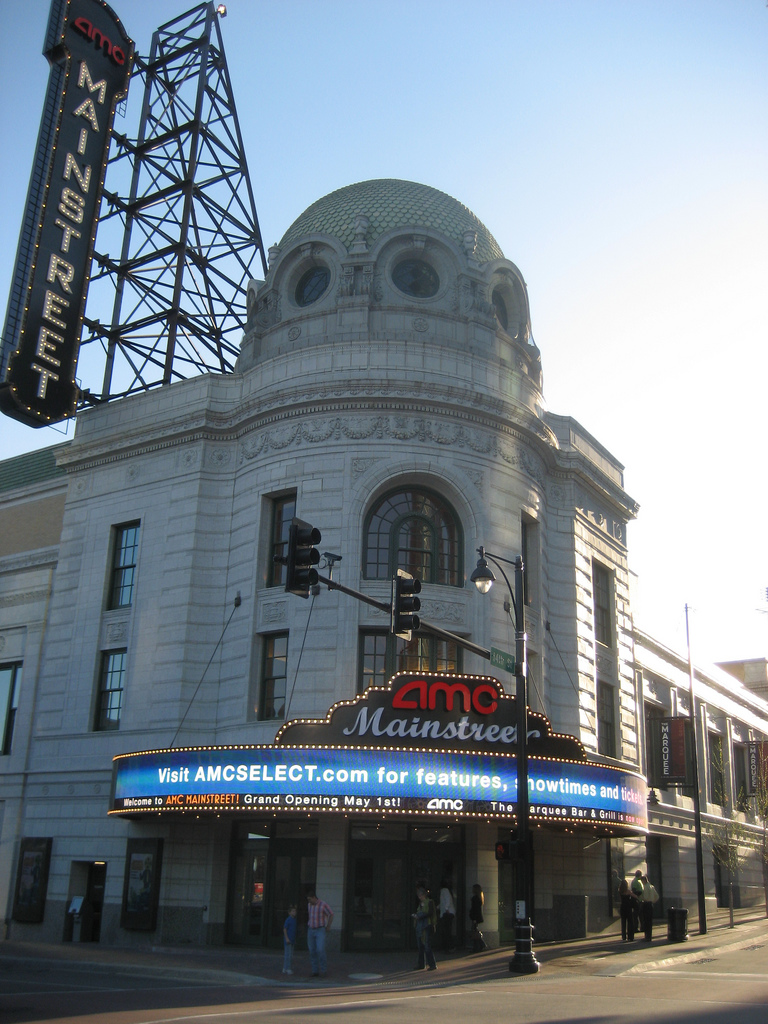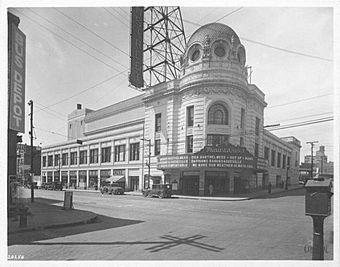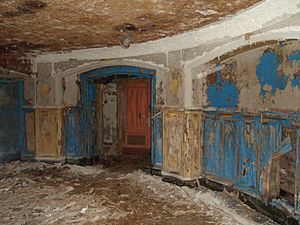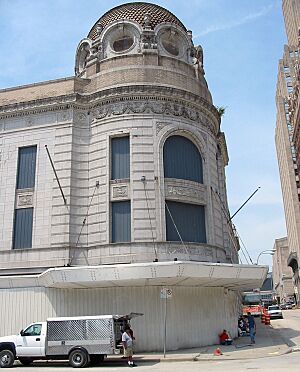Mainstreet Theater facts for kids

Mainstreet Theater in the Power & Light District
|
|
| Former names | RKO Missouri Empire Theater |
|---|---|
| Location | 1400 Main Street Kansas City, Missouri |
| Coordinates | 39°05′50″N 94°35′01″W / 39.0971°N 94.5836°W |
| Owner | The Cordish Companies |
| Operator | B&B Theatres |
| Type | Movie theater |
| Capacity | 3,200 originally |
| Construction | |
| Opened | October 30, 1921 Reopened May 1, 2009 |
| Renovated | 1967, 1980, 2008, 2021 |
| Reopened | 2021 |
| Website | |
| www.bbtheatres.com | |
The Mainstreet Theater, also known as The Empire Theater, is a famous old theater in downtown Kansas City, Missouri. It is located in the exciting Power & Light District. This theater is very important because it was added to the National Register of Historic Places in February 2007. This means it is a special building worth protecting.
Contents
History of the Mainstreet Theater
How the Theater Began
The Mainstreet Theater was designed by a famous architecture team called Rapp & Rapp. It first opened its doors on October 30, 1921. The theater was huge, covering about 90,000 square feet. It had 3,200 seats, making it a very popular place for both vaudeville shows and movies. Vaudeville was a type of entertainment with many different acts, like singers, dancers, and comedians.
The inside of the theater looked like a fancy French palace, with a style called French Baroque. The outside mixed two styles: Neoclassical and French Second Empire. The main entrance hall, called the lobby, had a beautiful dome ceiling with round windows. For a while, the Mainstreet Theater was the biggest theater in Kansas City.
Special Features for Families
The Mainstreet was the first theater in Kansas City to have a special nursery for children. Parents could leave their kids with a trained nurse while they watched a show. The nursery had toys and games for older kids and cribs for babies.
The theater also had secret spaces in its basement. These areas were used to keep animals for the vaudeville shows. There was even an elephant cage and a pool for seals! A large elevator could carry elephants right up to the stage. Many famous performers played here, like Cab Calloway and the Marx Brothers. In the early 1920s, over 4,000 people visited the theater every day.
In April 1941, the theater's name changed to the RKO Missouri Theater. It even showed special three-strip films called Cinerama.
|
Mainstreet Theatre
|
|

The Mainstreet Theater as it originally appeared, prior to several name changes and removal of the large sign suspended from the roof
|
|
| Location | 1400 Main St., Kansas City, Missouri |
|---|---|
| Area | Less than one acre |
| Built | 1921 |
| Built by | Thompson-Starrett Construction Co. |
| Architect | C.W. Rapp and Geo. L. Rapp |
| Architectural style | Beaux Arts |
| NRHP reference No. | 07000043 |
| Added to NRHP | February 15, 2007 |
The AMC Years
AMC Theatres, which was then called Durwood Theatres, bought the Mainstreet Theater in the late 1950s. They reopened it in December 1960, calling it The Empire. The first movie shown under the new name was Exodus. The theater's seating was changed to 1,260 seats to make room for new technology.
The Empire theater had a huge movie screen, about 70 by 30 feet. This screen could fold up and be stored away in just a few hours. This made it easy to switch between showing movies and hosting live stage events. The stage curtain was also enormous, measuring over 120 feet. It was said to be the largest in the world!
Kansas City is known as the "City of Fountains". So, the Empire theater added decorative fountains in its ticket area and near the main staircase. The big signs that hung from the roof in earlier years were removed when it became the Empire.
In 1967, the theater was divided into two separate movie screens. One was built in the original balcony area. Later, in 1980, AMC turned the Empire into four smaller theaters. It was then known as Empire 4 Theaters. The Empire stopped showing movies and closed its doors in 1985.
A Time of Uncertainty
After closing, the Empire Theater faced a difficult future. It was often in danger of being torn down. Many people tried to save it. In 1986, famous actor George Burns even wrote a letter to help get the theater recognized as a historic landmark.
Because the theater was not officially listed as a local landmark or on the National Register of Historic Places, it didn't have much legal protection. The building was falling apart. Bricks were falling off, and trees were even growing from the roof!
The city of Kansas City eventually bought the theater in late 2004. This was part of a plan to build the new Power & Light District. Workers had to clean up a lot of asbestos and mold from the building. About 200 dump-truck loads of old materials were removed during this cleanup.
The Theater Reopens
The AMC Mainstreet Theater reopened to the public on May 1, 2009. It was now part of the new Power & Light District. AMC spent $30 million to fix up the theater. They called it their "flagship theater," meaning it was one of their most important locations.
The newly renovated theater had three regular movie rooms on the ground floor. Upstairs, there were special "cinema suites." These rooms had comfy reclining chairs, food trays, and a button to call a server. All the movie rooms had advanced digital projectors and amazing sound systems. AMC said it was one of the most high-tech theaters in the world.
The lobby area also featured a restaurant called The Marquee, which opened in March 2009. In May 2009, the theater received an award for its preservation efforts from the Historic Kansas City Foundation.
New Owners and a New Chapter
On June 4, 2012, it was announced that Alamo Drafthouse Cinema would take over running the theater. They started selling tickets soon after.
However, in March 2021, the owners of the Kansas City Alamo Drafthouse announced they were closing the theater for good. This was due to the COVID-19 pandemic. But just a month later, in April 2021, B&B Theatres bought the Mainstreet Theater. It reopened at the end of September 2021, continuing its long history as a beloved entertainment spot in Kansas City.
 | Percy Lavon Julian |
 | Katherine Johnson |
 | George Washington Carver |
 | Annie Easley |





